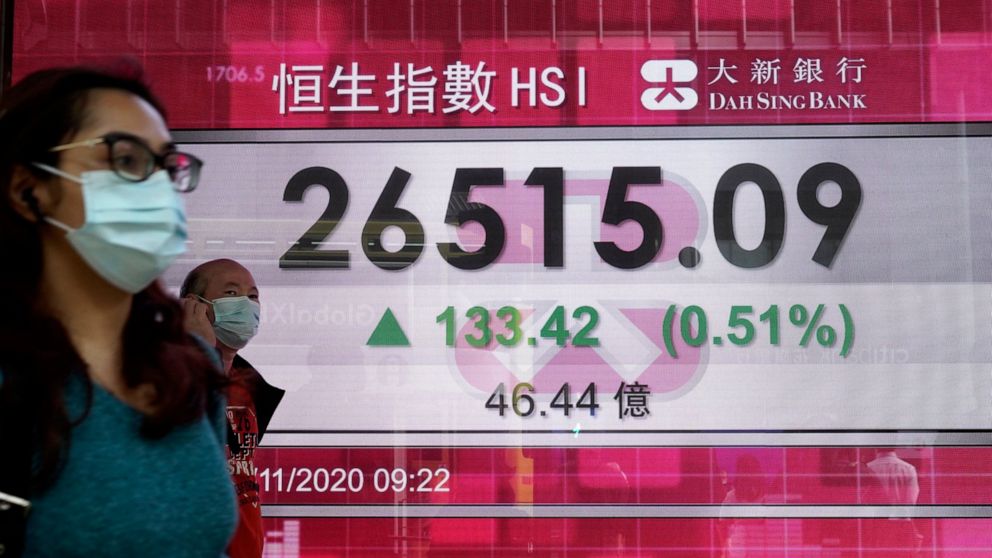Wall Street taps the brakes following its record-setting run
U.S. stocks are falling in morning trading on Tuesday, giving back a bit of the big gains made this month that vaulted them back to record heights
NEW YORK — U.S. stocks are falling Tuesday, giving back a bit of the big gains made this month that vaulted them back to record heights.
Treasury yields also dipped after a report showed U.S. shoppers spent less at retailers last month than economists expected. The numbers underscore how the coronavirus pandemic is worsening and threatening to drag the economy lower, at least in the near term.
Stocks that stormed higher this month on hopes that a vaccine or two may get the global economy back to normal next year receded amid the worries, particularly energy producers, banks and other companies that would benefit most from a reopening economy.
The S&P 500 was down 0.8% in morning trading, on pace for its first drop in three days. The Dow Jones Industrial Average was also pulling lower from its record high, and it was down 317 points, or 1.1%, at 29,633, as of 10:30 a.m. Eastern time. The Nasdaq composite was 0.3% lower.
Sharp losses for companies in the pharmacy business helped drag the market lower after Amazon targeted them as the latest industry it’s trying to upend. The retailing behemoth opened an online pharmacy Tuesday that allows customers to have prescriptions delivered to their door in a couple days.
CVS Health fell 6.6%, Walgreens Boots Alliance dropped 8.8% and Rite-Aid lost 13.9%. Amazon, meanwhile, rose 0.4%.
On the winning side was Tesla, which soared 9.8% following an announcement that it will join the S&P 500 index next month. The index is hugely influential, and nearly $4.6 trillion at the end of last year was in funds that mimic the S&P 500.
The electric-vehicle company had already soared 388.8% in 2020 before Monday evening’s index announcement. It’s grown so massive that the company behind the S&P 500 is asking investors whether they think it should add Tesla to the index all at once or in two steps. With a total market value rivaling Johnson & Johnson’s and JPMorgan Chase’s, it’s set to become one of the biggest stocks in the S&P 500.
The broader stock market was slowing Tuesday, though, and 85% of stocks in the S&P 500 were lower.
Energy companies fell 1.8% for the biggest loss among the 11 sectors that make up the index. They tend to move sharply with expectations for the economy, and crude oil prices fell as expectations for demand diminished.
Financial stocks also have been moving with expectations for an economy unencumbered by the virus, one where workers can get jobs again and make good on all their loans. JPMorgan Chase fell 2% and was one of the heaviest weights on the S&P 500.
Sales at U.S. retailers rose 0.3% last month from September, a sharp slowdown from September’s 1.6% growth. The figure also fell short of economists’ expectations for 0.5% growth.
Part of the shortfall is likely because laid-off workers are no longer getting extra unemployment benefits from the U.S. government following the expiration of several financial-support programs from Congress. Democrats and Republicans in Washington have talked about renewing some of the programs, but progress has been painfully slow amid deep partisanship in Washington.
That’s layering on top of the already accelerating pandemic, which is pushing governments across the United States and Europe to bring back varying degrees of restrictions on daily life in hopes of slowing the spread of the virus. Health experts are warning of a bleak winter on the way.
That’s all helped dilute some of the optimism that’s rushed through markets since early last week. Companies have released encouraging early results for a couple potential COVID-19 vaccines, which is raising hopes that the economy can get back to normal and stocks beaten down during the pandemic can roar back to life. Even with Tuesday’s decline, the S&P 500 is still up about 10% for November so far. That’s better than any monthly performance for the index since April, when stocks were exploding higher following their pandemic-induced plunge.
The yield on the 10-year Treasury fell to 0.87% from 0.89% late Monday.
In Europe, Germany’s DAX lost 0.4%, and France’s CAC 40 slipped 0.2%. The FTSE 100 in London fell 1.5%.
In Asia, stocks were mixed. Japan’s Nikkei 225 rose 0.4%, and Hong Kong’s Hang Seng inched up 0.1%. South Korea’s Kospi slipped 0.2%, and stocks in Shanghai lost 0.2%.
———
AP Business Writer Yuri Kageyama contributed.
![]()


